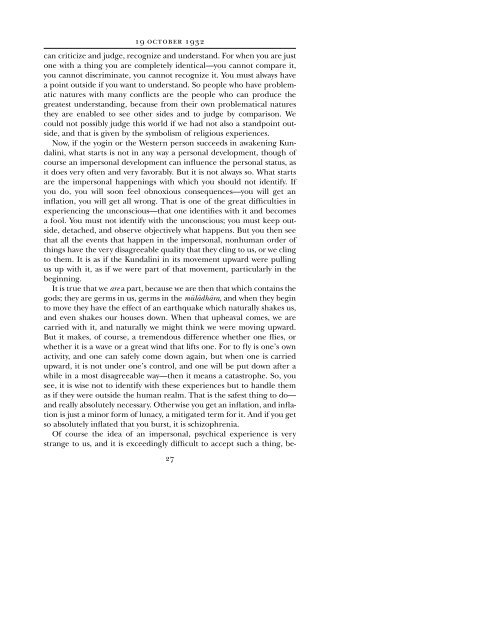CG JUNG - Countryside Anarchist
CG JUNG - Countryside Anarchist
CG JUNG - Countryside Anarchist
You also want an ePaper? Increase the reach of your titles
YUMPU automatically turns print PDFs into web optimized ePapers that Google loves.
19 OCTOBER 1932<br />
can criticize and judge, recognize and understand. For when you are just<br />
one with a thing you are completely identical—you cannot compare it,<br />
you cannot discriminate, you cannot recognize it. You must always have<br />
a point outside if you want to understand. So people who have problematic<br />
natures with many conflicts are the people who can produce the<br />
greatest understanding, because from their own problematical natures<br />
they are enabled to see other sides and to judge by comparison. We<br />
could not possibly judge this world if we had not also a standpoint outside,<br />
and that is given by the symbolism of religious experiences.<br />
Now, if the yogin or the Western person succeeds in awakening Kundalini,<br />
what starts is not in any way a personal development, though of<br />
course an impersonal development can influence the personal status, as<br />
it does very often and very favorably. But it is not always so. What starts<br />
are the impersonal happenings with which you should not identify. If<br />
you do, you will soon feel obnoxious consequences—you will get an<br />
inflation, you will get all wrong. That is one of the great difficulties in<br />
experiencing the unconscious—that one identifies with it and becomes<br />
a fool. You must not identify with the unconscious; you must keep outside,<br />
detached, and observe objectively what happens. But you then see<br />
that all the events that happen in the impersonal, nonhuman order of<br />
things have the very disagreeable quality that they cling to us, or we cling<br />
to them. It is as if the Kundalini in its movement upward were pulling<br />
us up with it, as if we were part of that movement, particularly in the<br />
beginning.<br />
It is true that we are a part, because we are then that which contains the<br />
gods; they are germs in us, germs in the mÖlvdhvra, and when they begin<br />
to move they have the effect of an earthquake which naturally shakes us,<br />
and even shakes our houses down. When that upheaval comes, we are<br />
carried with it, and naturally we might think we were moving upward.<br />
But it makes, of course, a tremendous difference whether one flies, or<br />
whether it is a wave or a great wind that lifts one. For to fly is one’s own<br />
activity, and one can safely come down again, but when one is carried<br />
upward, it is not under one’s control, and one will be put down after a<br />
while in a most disagreeable way—then it means a catastrophe. So, you<br />
see, it is wise not to identify with these experiences but to handle them<br />
as if they were outside the human realm. That is the safest thing to do—<br />
and really absolutely necessary. Otherwise you get an inflation, and inflation<br />
is just a minor form of lunacy, a mitigated term for it. And if you get<br />
so absolutely inflated that you burst, it is schizophrenia.<br />
Of course the idea of an impersonal, psychical experience is very<br />
strange to us, and it is exceedingly difficult to accept such a thing, be-<br />
27


